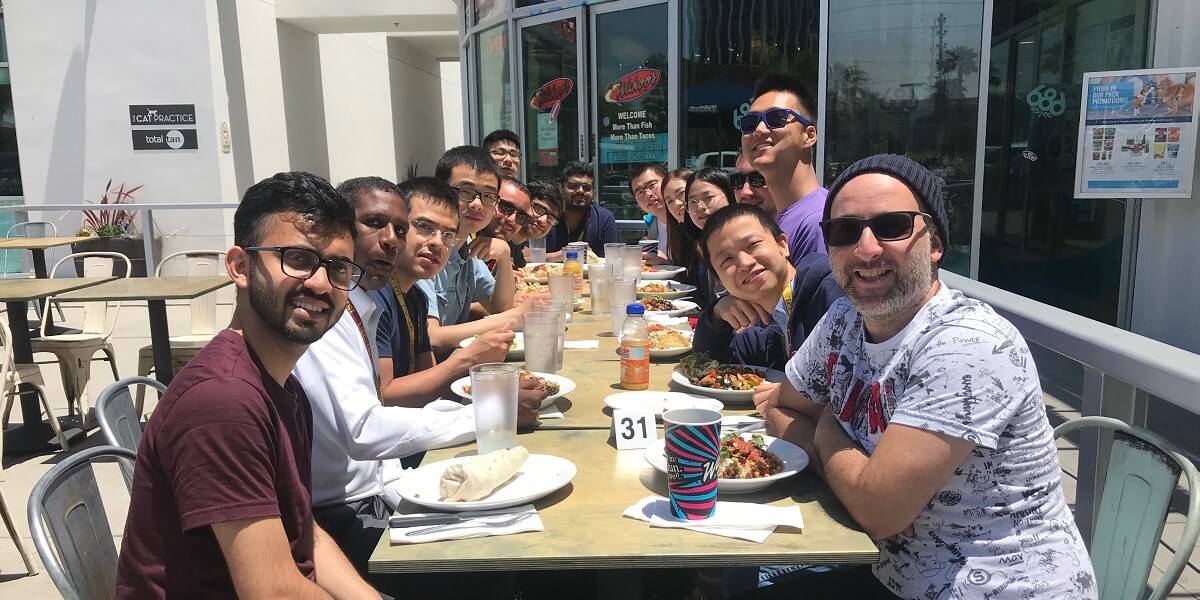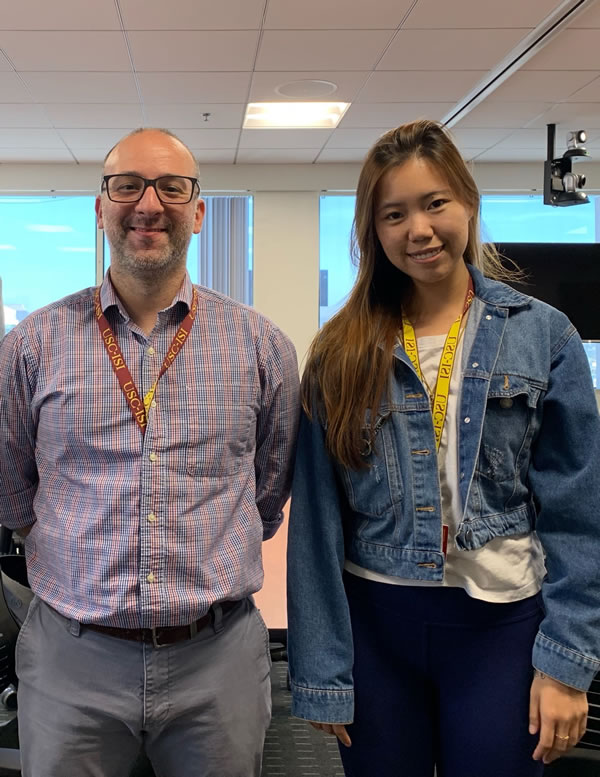Students Find New Opportunities, Focus through ISI Summer Internship Program

Summer internships are a great way for students to gain skills and experience in their field of study. And for students interested in the impacts of digitization, AI, cybersecurity, and other topics at the forefront of science and society, USC’s Information Sciences Institute (ISI) has got you covered.
The ISI Summer Internship Program provides university students a paid opportunity to take part in the cutting-edge research taking place at ISI. The interns work directly with research leadership and their teams at one of ISI’s three locations: Marina del Rey, CA, Arlington, VA, or Waltham, MA.
There are a variety of research areas that students can work in, such as Machine Learning and Data Science, Computing Systems and Technologies, Internet and Networked Systems, Cybersecurity Research and Experimentation, and Knowledge Technologies. Exceptional interns may also be named Director’s Interns, receiving Institute-wide recognition for their work and an opportunity to present their research at a colloquium.
Past students had the opportunity to work on a wide range of research to help further their own studies. Last year, PhD students Hao Peng, Miley Yao, and Mariam Nouh interned with Emilio Ferrara, Research Team Leader at ISI and Research Assistant Professor and Associate Director of Informatics & Data Science at the USC Department of Computer Science. Ferrara also serves as the Principal Investigator at the USC/ISI Machine Intelligence and Data Science (MINDS) group.
Hao Peng is a PhD student at the School of Information at the University of Michigan, where he studies computational social science, focusing on complex systems and the science of science. Peng’s experiences at ISI proved to be fruitful, as he ended up taking part in the ISI Summer Internship Program twice, once as a Master’s student in 2017 and once as a PhD student in 2019. “I was interested in this program, as my master advisor recommended it to me,” he said. “I’m glad that I took his advice three years ago. I had a great research experience with professor Emilio Ferrara during my first internship at ISI. That’s why I came back in 2019.”
In his latest internship in 2019, Peng worked on two projects with Ferrara. “The first one studies how network structure impacts the efficiency of information diffusion,” he explained. “To answer this challenging question, we used computer simulations and analytical predictions to examine the influence of network modularity on the speed of information diffusion in the case of complex contagions, where each user adopts a social behavior when at least a fraction of their friends also did so. We find that there always exists an optimal network modularity for the most efficient information diffusion process at the global scale.”
The second project Peng worked on in the ISI Summer Internship Program studied ethnic bias in academic citations, which was related to Peng’s previous work. “In my past work, I [studied] citation bias in soft and hard sciences and [found] that, even in the same broad discipline, the harder research (more math oriented) tends to exhibit more consensus and can attract more citations than the soft counterpart (more social science oriented).” The project is ongoing. “[We] find that scientists in the same ethnicity group tend to cite each other’s work more frequently than expectation by random chance,” he said. “This implies that citation counts would benefit scientists in large ethnicity groups.”
Taking a different angle on examining academia, Miley Yao, a PhD student from SUNY Albany, is currently working in the educational data mining field, with a research focus on mining student’s learning patterns and predicting procrastinations. “I came across the ISI internship opportunity because of my previous advisor—he got his PhD at USC and apparently worked in the same building where ISI is at,” she said. “We both thought it was going to be a great opportunity for me, and it turned out to be the case!”

Yao (right) pictured with Ferrara in summer 2019
While working with Ferrara through the ISI Summer Internship Program, Yao’s research focus was on cyberbullying detection and prediction on social media. “Before I went, Emilio was very supportive and told me to choose whatever topics I was interested in,” Yao said. “I just happened to have this idea, so I implemented it during the internship. Basically what we did is try to find the different communication patterns between cyberbullies and normal users by modeling their communications via a point process model.”
According to Yao, for this project, she worked with researchers to capture user interaction patterns on Instagram for cyberbullies and normal users, respectively, trying to find any possible differences in regard to these patterns. “As we care about if and how users influence each other in terms of posting or commenting, we used point processes models, because they model the time difference between two consecutive events (i.e., comments), with the goal to find which comments were triggered by which others, even though there’s no direct connections between them,” she explained. “For example, if I saw you commenting on some user’s picture and the content motivates me to comment, too, even though I didn’t ‘@’ you, you still influenced me.”
Through their work, Yao found that the communication patterns for bullies and normal users were very different through mining unique temporal structures of user interactions. “We also spotted some hidden influencers (meaning they didn’t directly contact with anyone, but are shown to be influential in triggering other consequent interactions) and they tend to be bullies. We used an existing Instagram dataset for these experiments.” Online influences can potentially also extend to online crime. A PhD candidate in Cybersecurity at the University of Oxford, Mariam Nouh’s research deals with understanding existing challenges in relation to cybercrime investigations. She also studies the various threats related to abuse on online platforms and developing methods to detect this kind of behavior.
While Peng and Yao were recommended to take part in the ISI Summer Internship Program, Nouh came across the Program online and took the initiative to apply after seeing all that ISI had to offer. “I first heard about the ISI internship through social media,” she said. “By looking at the different research groups at ISI and the variety of topics being offered, I got interested, as many of the topics overlapped with my research interest. In addition, the great facilities offered by ISI, such as the computing infrastructure and the accessibility to datasets, were a great motivating factor to spend the summer there. Talking to previous interns and learning about their positive experience helped me make the decision to apply to this program.”
Nouh’s internship project was perfectly in line with her own research interests. “I worked on a project that aims to understand the different social roles held by a group of online users that belong to an extremist group,” she elaborated, adding that the project’s goal was to understand the various social roles held by a group of online users belonging to a radical group. “We identify the different factors that describe each role and study how these roles change over time. For instance, individuals may start off by being seekers and lurkers for radical content (passive mode), and in time could be more engaged with the content and become inquirers, advocates, and activators (active mode).”
The project is still in progress. “We empirically identify different factors that can describe some of these states (roles) and study how these roles change over time,” she continued. “The aim [of the project] is to predict when an individual could turn from being only a seeker, for example, to an advocate for a particular radical ideology.”
For Peng, the ISI Summer Internship Program helped finetune the vision for his PhD projects. “The research I did at ISI extends way beyond the purpose of the internship,” he said. “After the summer, I did a class project at my home university examining ethnic bias in the media coverage of science.” The paper for Peng’s class project is currently under review at ICWSM 2020. “The summer experience really helped me to scope out the direction of my dissertation projects, which aims to understand human bias in scientific activities,” he added. This notion of the ISI Summer Internship Program helping drive students’ own research was echoed by Nouh. “[The Program] helped me to develop my skills further,” she said. “Also, it introduced me to new topics and research areas by attending group meetings and department seminars. By having multiple discussions with the research group and [Ferrara], new research ideas were formulated.”
Yao was also able to find a renewed sense of focus through the Internship Program. “My experience at ISI last summer was fantastic! I loved the people, the vibe, and all the opportunities there,” she said. “Being able to be exposed to all these great and humble people, especially Emilio, definitely motivated me a lot, even after I left.”
The deadline for applications is Friday, February 28. For more details on requirements and application instructions, click here.
Published on February 25th, 2020
Last updated on May 12th, 2021